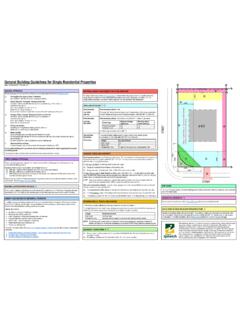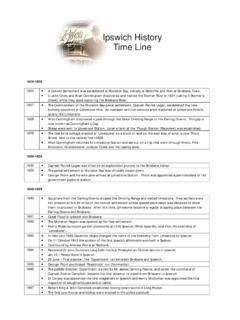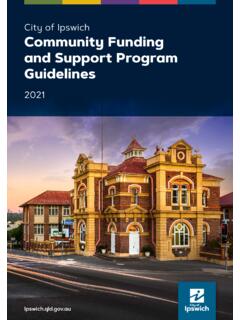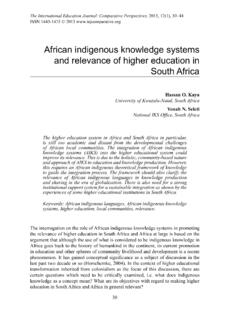Transcription of General Information Folio 5: Appropriate Terminology ...
1 Information adapted from Using the right words: Appropriate Terminology for indigenous Australian studies 1996 in Teaching the Teachers: indigenous Australian Studies for Primary Pre-ServiceTeacher Education. School of Teacher Education, University of NewSouth staff and students of the University rely heavily on languageto exchange Information and to communicate ideas. However,language is also a vehicle for the expression of discriminationand prejudice as our cultural values and attitudes are reflectedin the structures and meanings of the language we use. Thismeans that language cannot be regarded as a neutral orunproblematic medium, and can cause or reflect discriminationdue to its intricate links with society and culture. This guide clarifies Appropriate language use for the history,society, naming, culture and classifications of IndigenousAustralian and Torres Strait Islander Australian peoples are people of Aboriginal andTorres Strait Islander descent, who identify as Aboriginal orTorres Strait Islander and are accepted as an Aboriginal orTorres Strait Islander person in the community in which theylive, or have the right namesMore Appropriate indigenous Australian people/s Aboriginal people/s Aboriginal person Torres Strait Islander people/s Torres Strait Islander person The more Appropriate terms stress the humanity of Aboriginaland Torres Strait Islander people.
2 Aboriginal which in Latinmeans from the beginning and other such European words areused because there is no Aboriginal word that refers to allAboriginal people in Appropriate Aborigines The Aborigines The Aboriginal people Aboriginal, Aborigines The Torres Strait Islanders Blacks Whites Yellafellas ColouredUsing terms such as the Aborigines , or the Aboriginal people tends to suggest that Aboriginal people/s are all the same, andthus stereotypes indigenous Australians. The fact is thatIndigenous Australia is multicultural. Australia before the invasion was comprised of 200-300 autonomous languagegroups that were usually referred to as tribes , now more oftenas peoples , nations or language groups . The nations ofIndigenous Australia were, and are, as separate as the nationsof Europe or Aboriginal English words blackfella and whitefella areused by indigenous Australian people all over the country some communities also use yellafella and coloured.
3 Althoughless Appropriate , people should respect the acceptance and useof these terms, and consult the local indigenous community orYunggorendi for further Appropriate Murri - Qld, north west NSW Nyoongah - WA Koori NSW Goori - north coast NSW Koorie - Vic Yolngu - Arnhem Land Anangu - Central Australia Palawa - Tasmania Nunga (not always a more Appropriate term - SA) Ngarrindjeri SA - River Murray, Lakes, Coorong people Torres Strait Island Peoples Murray Island Peoples Mer Island PeoplesAboriginal language people terms such as Koori , Murri , Nyoongah are Appropriate for the areas where they 80% of the Torres Strait Island population now residesoutside the Torres Strait and as such, local Terminology such asMurray Island Peoples and Mer Island Peoples is also are also local names for particular Aboriginal and TorresStrait Islander language groups, for example Gamilaroy (NSW)or Pitjantjatjara (NT/SA).
4 Some people use Nunga in General reference to Indigenouspeoples who reside in and around the area of Adelaide. ManyIndigenous South Australians prefer people not to presume theright to use their word Nunga . Local indigenous Australian peo-ple (eg Yunggorendi staff at Flinders) can clarify Appropriate useof this and other Information Folio 5: Appropriate Terminology , indigenous Australian More Appropriate UluruLocal indigenous Australian peoples named all of Australia intheir languages before the invasion. Uluru is the Aboriginalname for this significant site in Central Australia which shouldbe respected and recognised. This recognition of IndigenousAustralia is fundamental to social Appropriate Ayers RockPart of the process of colonisation has been the Europeanrenaming of places and natural features all over Australia. AyersRock was a European name imposed on a section of Aboriginalcountry. No more classifying peopleMore Appropriate indigenous Australian peoples Aboriginal peoples Torres Strait Islander people or peoples may be preferable, depending on the contextUsing the more Appropriate terms helps to avoid attempting toinaccurately label, categorise and stereotype Appropriate Transitional Traditional Contemporary Modern Urban Rural Isolated or remote Aboriginal people/Torres Strait Islander peopleThe less Appropriate terms can be extremely offensive to manyIndigenous Australians as they categorise people and assumethat there are real differences between indigenous Australianpeoples of different areas.
5 It is critical that they are not used torefer to or to attempt to classify indigenous long-settled areas, the implication that urban IndigenousAustralians are less indigenous than traditional or transitional people and cultures is most offensive. A real issue is the real Aborigine syndrome the idea that the real Aboriginalpeople live in Arnhem Land or the Central desert, and that only traditional Aboriginal people and cultures are really Aboriginal .It is important to bear in mind that indigenous Australians havemuch more in common than the wide use of these categorisingterms would suggest. For example, most Aboriginal people who are classified as urban in fact have very close links to traditional country. Many indigenous Australians find the term transitional offensive as it implies progress upwards towardssomething better, the idea that assimilation into mainstream is should be used with terms such as rural , isolated and remote.
6 These words should refer to geographical location andaccess to services only. indigenous Australian communitieshave experienced divisiveness because these categorical termsimply that Aboriginal people living in these communities areless socialised than people living in urban Appropriate Aboriginal people/s, indigenous people/s, and Torres Strait Islander people/s Aboriginal and Torres Strait Islander people understand theirown history and identity, and recognise that physical features donot determine Aboriginal and Torres Strait Islander Appropriate Part-aborigine , full-blood , half-caste , quarter-caste , octoroon , mulatto , hybrid In the past, governments tried to classify Aboriginal and TorresStrait Islander people according to skin colour and parentageusing these less Appropriate terms. Exemption certificates wereissued to Aboriginal people with lighter skin colour to allowthem the same basic freedoms that people without Indigenousheritage took for granted as citizens.
7 The assumption was thatany Aboriginal or Torres Strait Islander person with any European blood was more intelligent, and a fitter member ofAustralian 1972 when the White Australia Policy was abolished, WhiteAustralia excluded indigenous Australian people by changes for indigenous Australian peoples were not introduced until 1967 through the referendum, and by returningland to some groups from more classifying culturesMore Appropriate indigenous nations Complex and diverse societies Efficient resource managers indigenous Australian societyThe effectiveness and sophistication of indigenous Australianresource management, and social organisation, is starting to bemore recognised. Less Appropriate Primitive Simple Native Prehistoric Stone ageThe less Appropriate terms are offensive in that they implyAboriginal and Torres Strait Islander societies are not as advanced as European societies. The terms are based on the progress model of history which many people now question,and on the idea of evolution from lower to higher (western)forms of social Appropriate Aboriginal people/s Aboriginal nations Aboriginal communities Mob/s Language groups Culture groups Nation , community , people , mob or the local language orculture group name is usually preferable to tribe.
8 Mob is anAboriginal English word and as such may be more Appropriate ,but community acceptance may be required before using thisword. Some Aboriginal people use the term tribe due to mainstream schooling in imposed Terminology and such usageneeds to be Appropriate Tribe Horde Band Clan Moiety Tribe is a European word that tends to impart western preconceptions developed from colonial experiences in NorthAmerica and Africa. Horde is a more technical word used byanthropologists, but its common usage also has sometimes use the terms band , clan and moiety to convey certain characteristics of cultural than trying to convey precise structures of IndigenousAustralian societies it may be more useful for teachers to con-vey the essence of indigenous Australian social Appropriate Seasonal occupation Rotational/cyclical occupation Looking after the country/the landThe rotational or cyclical occupation of land by Aboriginal people was inaccurately portrayed as being nomadic ratherthan the expression of an intimate knowledge of, and ability toharvest the land.
9 It was and is based on not staying in one placeand exhausting all resources, but moving around the territory at particular times when food resources became available. The crucial concept is belonging to the land .Less Appropriate Nomadic, nomads, nomadismNomadism has been associated with lack of land tenure oranchorage in land, and this has been coupled with the idea thatAboriginal people did not really occupy the land, but onlyroamed over it. The extension of the doctrine of terra nulliuswas based on this kind of distinction. Note that the 1992 MaboNative Title judgement by the High Court rejected terra nulliusas wrong both in fact and in law. For more Information , and spiritualityMore Appropriate The Dreaming The Dreamings The Dreaming or The Dreamings are mostly more appropriateas they describe indigenous beliefs as ongoing today. Manypeople use Dreamtime to refer to the period of Appropriate DreamtimeThe word Dreamtime tends to indicate a time period, whichhas finished.
10 In reality, the Dreamings are ongoing all overAustralia. However, many Aboriginal people do still use theword Dreamtime , and this usage must be Appropriate Spirituality Spiritual beliefsIn terms of indigenous belief systems, spirituality or spiritualbeliefs are more Appropriate . indigenous Australian spiritualityis localised by definition, it is more a way of life, of connectedness and Appropriate ReligionThe word religion tends to refer mainly to established, organised world or western religions. It is important to recognise that many indigenous people are religious in terms of mainstream religions, and often combine these beliefs withAboriginal Appropriate Creation/Dreaming Stories Teachings from the Dreaming/s Legends (Torres Strait Islander people only)It is Appropriate to use The Legends when referring to TorresStrait Islander culture. Creation Stories or Dreaming Stories convey more respect for Aboriginal Australian people s these terms conveys more Appropriate Myths Folklore Legends Story StoriesUsing words such as myth or story conveys the impressionthat Information from the Dreaming is not true or is trivial, oronly happened in the distant past.








